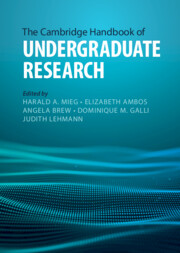Book contents
- The Cambridge Handbook of Undergraduate Research
- The Cambridge Handbook of Undergraduate Research
- Copyright page
- Contents
- Figures
- Tables
- Contributors
- Foreword
- Foreword
- 1 Introduction
- Part I Theory and Research on Undergraduate Research
- Part II Implementation, Approaches, Methods
- Part III Disciplines
- Part IV International Perspective
- Part V Avenues for Developing Undergraduate Research
- 73 Synopsis and Introduction
- 74 Community-Based Undergraduate Research
- 75 Interdisciplinary Undergraduate Research
- 76 Undergraduate Research in Digital Learning Environments
- 77 Crosscultural Undergraduate Research
- Index
- References
73 - Synopsis and Introduction
Toward a Democratization of Knowledge
from Part V - Avenues for Developing Undergraduate Research
Published online by Cambridge University Press: 11 August 2022
- The Cambridge Handbook of Undergraduate Research
- The Cambridge Handbook of Undergraduate Research
- Copyright page
- Contents
- Figures
- Tables
- Contributors
- Foreword
- Foreword
- 1 Introduction
- Part I Theory and Research on Undergraduate Research
- Part II Implementation, Approaches, Methods
- Part III Disciplines
- Part IV International Perspective
- Part V Avenues for Developing Undergraduate Research
- 73 Synopsis and Introduction
- 74 Community-Based Undergraduate Research
- 75 Interdisciplinary Undergraduate Research
- 76 Undergraduate Research in Digital Learning Environments
- 77 Crosscultural Undergraduate Research
- Index
- References
Summary
This chapter provides a synopsis of our Cambridge Handbook of Undergraduate Research. We argue that undergraduate research is made possible by, and responds to, changes in the ways we think about knowledge. Readers will be familiar with the contemporary social context, which often sees knowledge as a kind of free-for-all in which opinion is presented as fact, where knowledge gained through research competes in the political realm with supposition, and public discourse is steeped in deliberate misinformation. In the context of our handbook, such developments not only open up opportunities for students to engage in research, they also emphasize the importance of all students developing the skills to engage meaningfully and rigorously in evidence-based practice and to challenge unfounded assumptions. Knowledge has become democratized, and it is this that provides both the impetus and opportunity for widespread and equitable undergraduate research engagement.
Keywords
- Type
- Chapter
- Information
- The Cambridge Handbook of Undergraduate Research , pp. 661 - 669Publisher: Cambridge University PressPrint publication year: 2022



